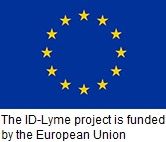(Vienna, 01-08-2016) The European Union has granted almost € 2 million to an international consortium that will bring a novel Lyme Borreliosis test to market. The project is led by Innatoss Laboratories from the Netherlands, and combines knowledge from Austria, Germany and the Netherlands. The team will finalize a break-through innovation for Lyme Borreliosis, making early diagnosis and timely treatment possible.
In total € 1.9 million have been granted to the ID-LYME project by the Horizon 2020 Fast Track to Innovation scheme, a part of the EU research and innovation program. The full consortium consists of the Medical University of Vienna (AU), DIARECT AG (DE), npk design and Innatoss Laboratories (NL). The ID-Lyme project is based on a proof of concept study and pre-clinical work performed by Innatoss. Their technology exploits the biomarker production of T cells to detect Lyme Borreliosis as early and distinct as possible.
Lyme Borreliosis, also known as Lyme disease, is one of the most frequent tick-borne infectious diseases worldwide with over 200,000 new infections each year in Western Europe alone. Treatments with antibiotics are most effective early after onset of the disease. If left untreated however, the infection can spread to the joints, heart and nervous system, causing severe complications. Timely treatment would reduce the impact of Lyme Borreliosis on people’s lives tremendously, as well as the associated healthcare costs, now estimated to be 660 million euros per year in the EU alone.
Project leader and CEO of Innatoss Laboratories Dr. Anja Garritsen explains the goal of ID-Lyme: “The development of a new type of accurate diagnostic test for Lyme Borreliosis is of utmost importance. Patients who do not have the typical Lyme Borreliosis symptoms, including the well-known red ring or erythema migrans, around the bite of the tick, are left untreated. Our T cell-based test can be employed almost immediately after tick detection and therefore will be an important addition to the diagnosis of Lyme Borreliosis.”
Prof. Dr. Gerold Stanek from the Medical University of Vienna is a key opinion leader on Lyme Borreliosis and part of the consortium. The second key scientist of the Vienna team is Prof. Dr. Hannes Stockinger, a profound immunologist with extensive experience in T-cells research. The team is convinced that by analyzing effector T cells, which precede the antibody response, and long-persisting circulating memory T cells, it will be possible, in contrast to the current tests, to diagnose Borrelia infections much earlier and to distinguish latent and chronic infections.
npk design from Leiden will tackle a logistical challenge related to cellular testing; the required incubation of blood soon after withdrawal. Wolfram Peters, CEO of npk design explains: “A dedicated combination of tools and workflow will be developed to ensure correct treatment of the blood samples involved. The consortium will work in close cooperation with users in laboratories across the EU to enable smooth implementation of this new Lyme test in their day-to day practice.”
The high quality antigens that are required for an accurate and reproducible test are manufactured by DIARECT AG from Freiburg, Germany. Diarect has been supplying antigens for autoimmune, infectious disease and allergy diagnostics to kit manufacturers since 1998. “In the past 18 years we have sold antigens that have been incorporated in over 1 billion blood tests world wide”, states Dr Heinz Haubruck, co-founder and CEO of DIARECT. “With our experience and expertise in protein expression and purification, we are pleased to be a part of this consortium and assist in bringing this novel diagnostic test to market.”
The ID-Lyme project will run for 3 years and result in market launch of the new cellular test in 2019. Other companies, medical centers, diagnostic laboratories and patient organizations will be involved during the whole development period.
